“Jesus Christ! This is creepy!” Ana S., an administrator from Zagreb, Croatia, couldn’t hide her disbelief when I showed her a Facebook page of Kastrup Airport, supposedly serving the Danish capital of Copenhagen. A series of photographs displaying stacks of suitcases and a screaming-yellow sign “Mistet bagage 10.00 Kr” was an unsettling déja vu. Ana instantly knew; she became a victim of an organized international lost luggage scam.
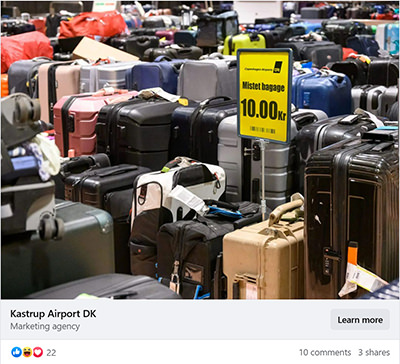
The young Croat didn’t need to speak Danish to recognize the familiarity of Kastrup Airport’s promotion. Just a week prior, she stumbled upon a rather similar Facebook campaign claiming that Zagreb Airport also had a problem with their “lost & found” storage capacity. To free up space in the repository, they were offering a “one-of-a-kind” opportunity to residents; buy an unclaimed piece of luggage for just 2.95 euros.
Okay, Croatian “izgubljena prtljaga” was twice as expensive as Danish “mistet bagage”. But the original price tag was €100, the website stated. So the offer was still quite a steal. As Ana and many others found out, it would literally be that – a steal.
The path from lost luggage to lost money is quick and sobering
Since at least October 2023, fake lost luggage sales have circled the globe like Barnum‘s traveling deception fairs. From Dublin Airport lost luggage scam to Air NZ lost luggage scam, false advertising on Facebook tried to prove that “there’s a sucker born every minute”.
The recipe was eerily similar: a little Photoshop magic and some enthusiastic testimonials successfully led users away to shady websites. The initial wire transfer of a few bucks would soon reveal to be the tip of an iceberg. The path from lost luggage to lost money was quick and sobering.
Even if unclaimed luggage sales are not your thing, keep reading about the experiences of people who fell for this elaborate internet hoax. You will not only learn how to steer clear of sneaky lost luggage scams but also how to detect always lurking and constantly adjusting fraudulent activity on the web!
In this era of sophisticated ways to empty our wallets, one has to be especially cautious. When seeing advertising that makes your eyes sparkle, approach it with due diligence. Otherwise, you might end up like visitors of that Willy's Chocolate Experience in Glasgow!
The web of deceit behind the baggage bazaar
Zagreb Airport, which consistently wins awards for its stellar service (the latest one praising it for the easiest airport journey in Europe), seemed to be quite overwhelmed with passengers’ baggage. The Facebook post that piqued Ana’s curiosity clarified that the expenses of taking care of all the lost and unclaimed luggage were too high. To enable more efficient operations, the airport decided to sell it all off, with a simple click on the “shop now” button.
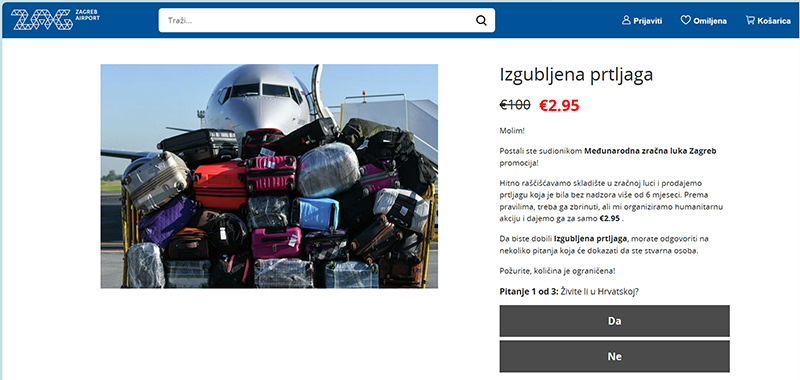
The innocent-looking button led to fly3aga3.quest, a web domain registered just a month ago in Reykjavik, Iceland. But there was Zagreb Airport’s logo, and the message stating the following: “We are urgently clearing the warehouse at the airport and selling luggage that has been unattended for over 6 months. According to the rules, it needs to be taken care of, but we organize a humanitarian action and give it away for only €2.95.”
Participating in the call almost sounded patriotic. With less than 3 euros, one can get an unclaimed suitcase with potentially significant valuables inside, help the struggling local airport, AND support the unspecified, but still – a humanitarian cause!
A sense of urgency was created, because “the quantities were limited”, the website cunningly declared. All that stood between you and potential treasure, was “proving that you are a real person”. To do that, three questions had to be answered:
- Do you live in Croatia?
- Are you over 18 years old?
- Have you ever bought lost luggage before?
Whatever you answered, a congratulatory screen appeared, felicitating the successful confirmation that (well done!) you were indeed – human. It didn’t matter if you lived in Croatia or not, if you were a minor or an adult, a seasoned luggage buyer or a scam virgin. Your clicking made you feel in the right place.
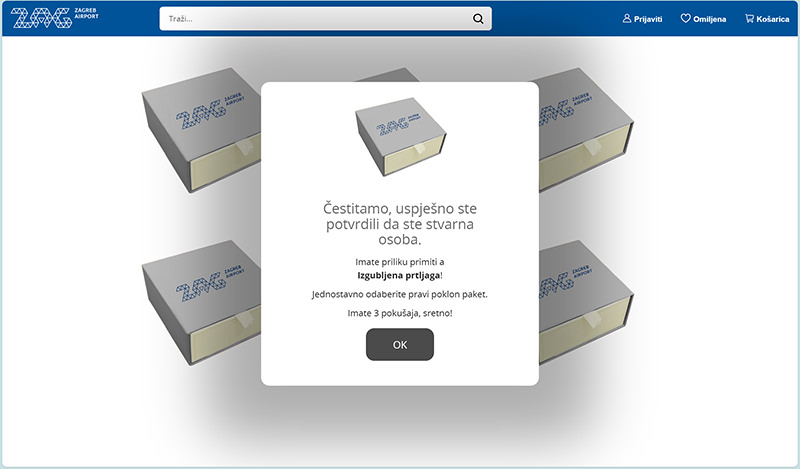
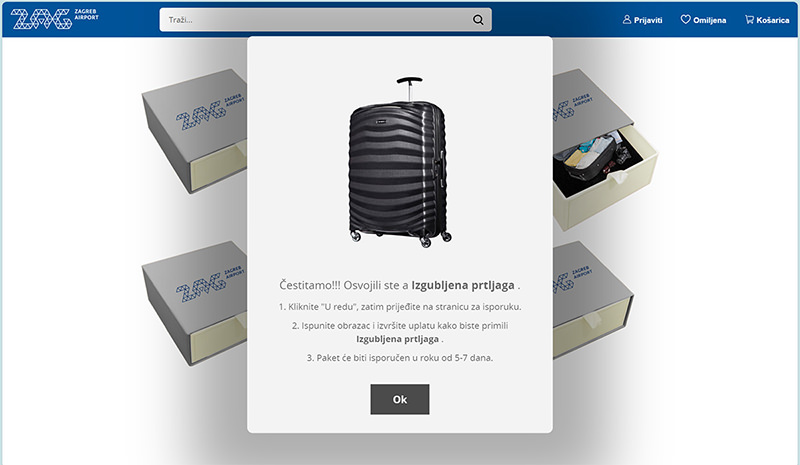
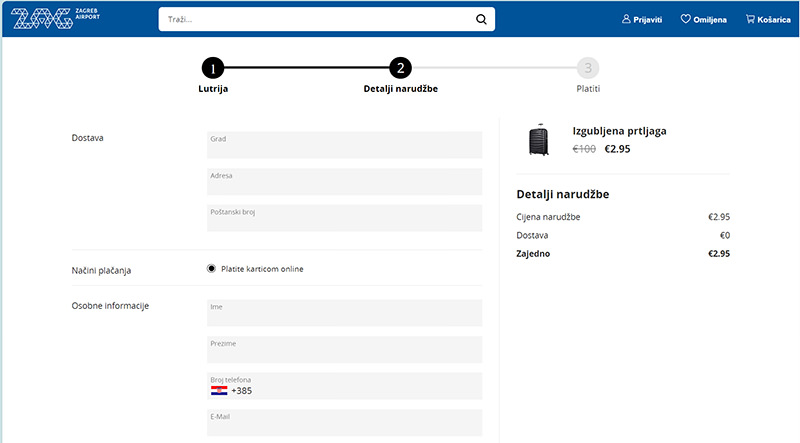
Lost luggage lottery
“I love traveling”, Ana says. “Personally, I never lost my luggage, so that was foreign to me, but it was also interesting. I know which things people usually bring on their travels, especially for longer trips to faraway destinations.”
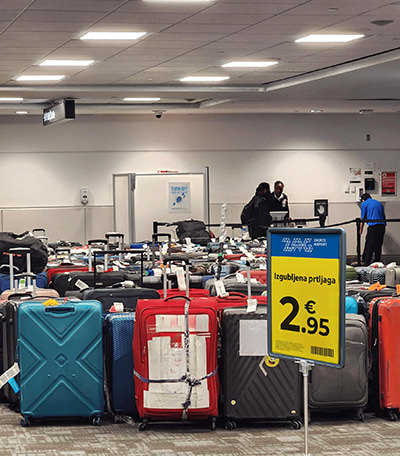
Our ‘phishing’ victim didn’t just jump on the hook: “I saw a couple of first comments, and none of them were negative.”
On the contrary, the fake Facebook page of Zagreb Airport had glowing testimonials of satisfied customers joyfully revealing all sorts of treasures they found in their purchased bags.
“I decided to try my luck, there was jewelry in the suitcase, I don’t know how valuable it is, I don’t understand it, but all in all it is a good promotion, I have already recommended it to family and friends.”
“I had a hairdryer and a Dyson iron in my suitcase, I’m happy, no matter what they tell me, I don’t have the opportunity to buy them. Thanks a lot!”
“I ordered 2 suitcases, one had a laptop, admittedly without a charger and with a password, but cool anyway! 😜”
Some posted photographs of their “lottery suitcases”, exposing that they have found anything from designer perfumes and high-end accessories to top-shelf whiskey.
But for the most skeptical doubting Thomases, there were also some just meh-happy customers, such as this one:
“At first I wondered why they were selling suitcases at the airport, but I ordered anyway, because it was interesting, I was contacted by a manager and answered all the questions, I can not say that I got something super valuable, but the offer was interesting, everything cost 2 €.”
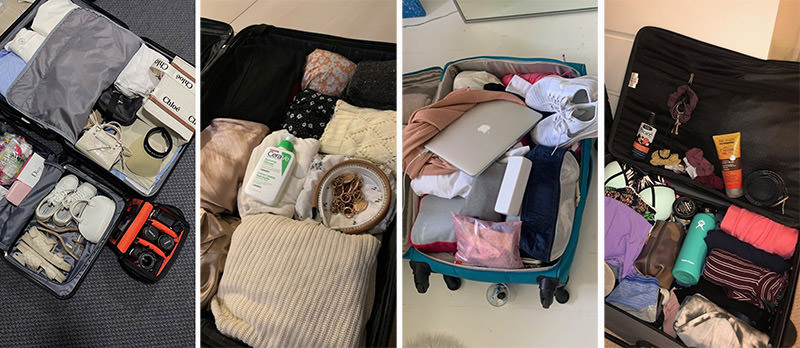
Virtual vault – from Canon to Armani
Like in any sales funnel, social proof is a booster, and this one worked. “Nothing draws a crowd quite like a crowd”, as old P.T. Barnum once said.
Blinded by the promise of riches, people from all corners of the globe joined the suitcase roulette hoping that they too would be able to earn bragging rights and show off their spectacular finds.
From the United States to the United Kingdom, Facebook users claimed to have paid a few coins and scored MacBooks, Canon cameras, iPhones, Ray-Ban sunglasses, a Louis Vuitton bag, Armani clothing, Nike sneakers, branded toiletries and cosmetics. There were even wallets stuffed with cold, hard cash. Because why wouldn’t you stash your dollars in a checked-in bag?
Photographic evidence (“borrowed” from social media such as Twitter, Pinterest, or Reddit) always showed neatly packed suitcases, filled to the brim with only the good stuff. None of the lucky winners objected to finding the most expected suitcase content – someone’s dirty laundry. There was only pure, unadulterated luxury.
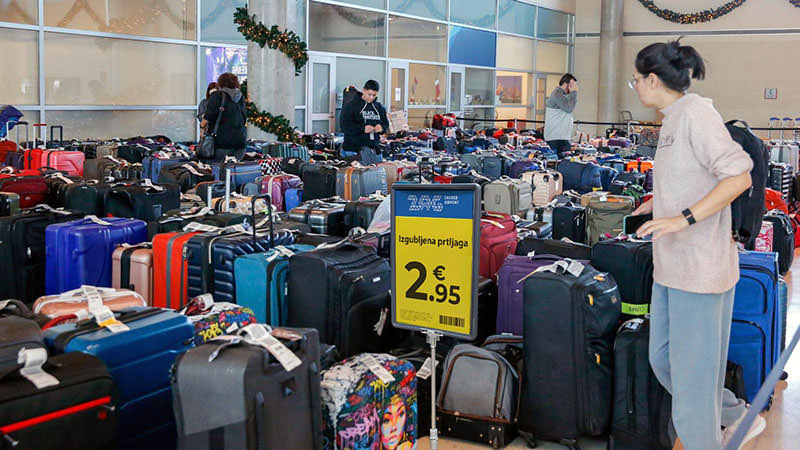
Tricked on the tracks
“I was on a train, heading home after work”, Ana explains how it all happened. She’s employed in a private company as a girl Friday, a Jill of all trades, if you will. But that day at work, filled with piles of numbers and paperwork, had to be quite exhausting; it was a perfect set-up to lure an unsuspecting customer into a network of deception.
“Tiredness overtook me when I saw the Facebook ad”, the lost luggage scam victim recalls. “There was no real peace or silence around me. I didn’t pay attention to detail, I wasn’t concentrated at all. The opportunity popped up, and it was too good to ignore.”
With exhaustion clouding her judgment, Ana didn’t notice that the Facebook page ‘Zračna luka Zagreb’ didn’t even exist before February 19, 2023. The page’s original name was ‘J O L I E’ and, in 2020, it was promoting a shoe brand.

The fraudsters didn’t care about erasing the history of posts selling footwear to Colombian ladies. They didn’t try to hide the makeover. Just 12 posts down, it was clear that this supposed page of Zagreb Airport was an impersonation.
“I scrolled down and noticed that myself, but it was too late. I just never expected an airport to be involved in such a scandal”, Ana says.
The electric shock of the bargain-hunting
Mario P., an electrician from Sisak, also overlooked the fine details before succumbing to the siren song of credit card fraud. He was drawn to it like a moth to a flame, believing that it would be a shame to miss this great deal that blessed his Facebook feed.
“I was naive. Usually, I’m not. I’m truly careful, but this was a moment of inattention. I was hasty”, he admits. “Only after I gave them my card details, I saw that the comments were in Croatian, yet all of the commenters had foreign names.”
Indeed, none of the lost luggage scam victims noticed that positive feedback was published in nearly perfectly translated Croatian.
However, Stanislas Faubert lived in France, Anton Fischer was in Austria, Lenka Babičová resided in Slovakia, and Ethan Walker was Swiss. What these Croatian-speaking users had in common was that they were singing praises for the Zagreb Airport luggage sale, even if it should have been available only to Croatian residents.
All these profiles were created in a timeframe of a couple of months. Scam victims never suspected that these people might not even exist.
“Scumbags!”, Mario fumes with anger. “They nicely wrapped it up as if it’s an airport, so nothing was suspicious. And the page has existed for years. But it seems nothing is secure today.”
Besides just using Photoshop to alter real photographs, scammers on Facebook also resort to AI-generated images. Learn the details that expose them, and whether you fell for any of these!
Scam-fest with fake airport photos
The airport shown in the photographs doesn’t exist either. At least, it is certainly not Zagreb Airport. As our investigation would show, these same images had been making the rounds in earlier lost suitcase scams.
Just 11 days prior, one of these photos appeared in the London Gatwick lost luggage scam, promoting the baggage sale for £1.
Another “Zagreb Airport Image” was published in November 2023, on a Facebook page advertising the lost luggage sale at Denver Airport, charging $2 per bag.
And back in October, Zagreb Airport masqueraded as King Abdulaziz International Airport in Jeddah, Saudi Arabia, offering up lost bags at the bargain price of 8 Riyals.
These were clearly not photos of Zagreb Airport. Those were not even airports of London, Denver, or Jeddah. All of it was completely fabricated.
Airports depicted by the images were actually located in Frankfurt, Moscow, and Hamburg, all scraped from online sources, and edited to add a bright yellow sign, with adjusted local currency and language. And a barcode. Because nothing makes suspicious transactions more believable than a barcode on the sign.
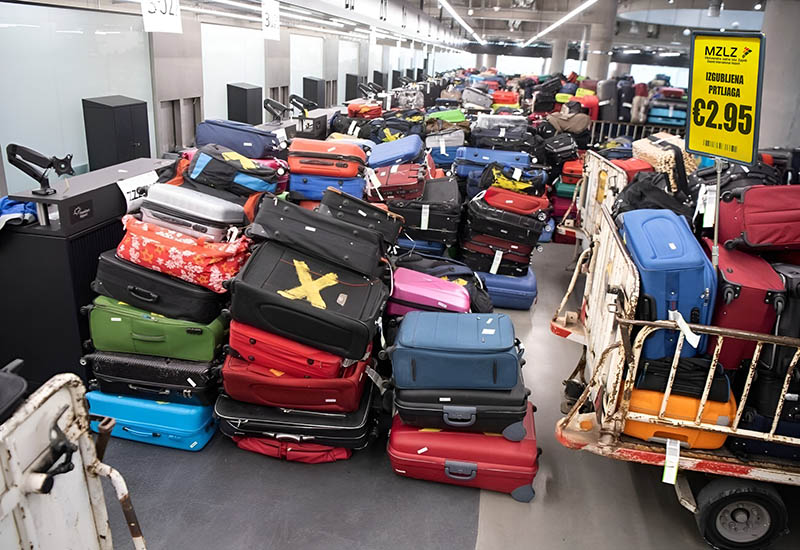
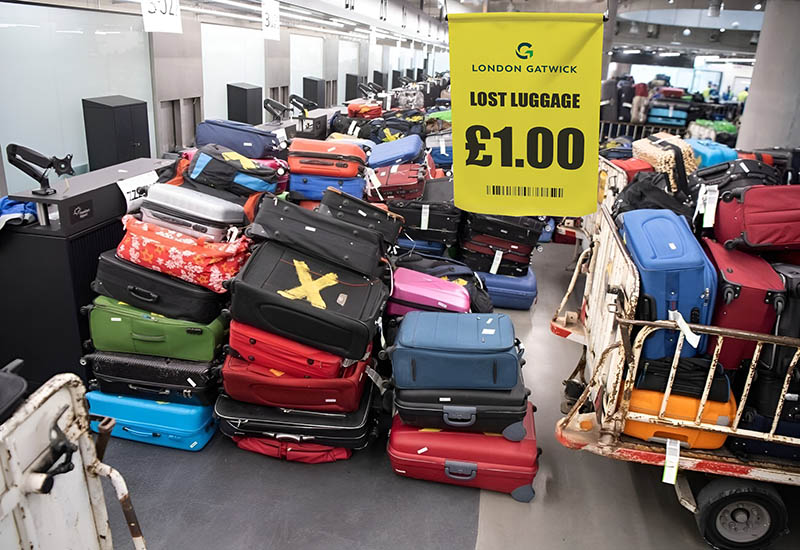
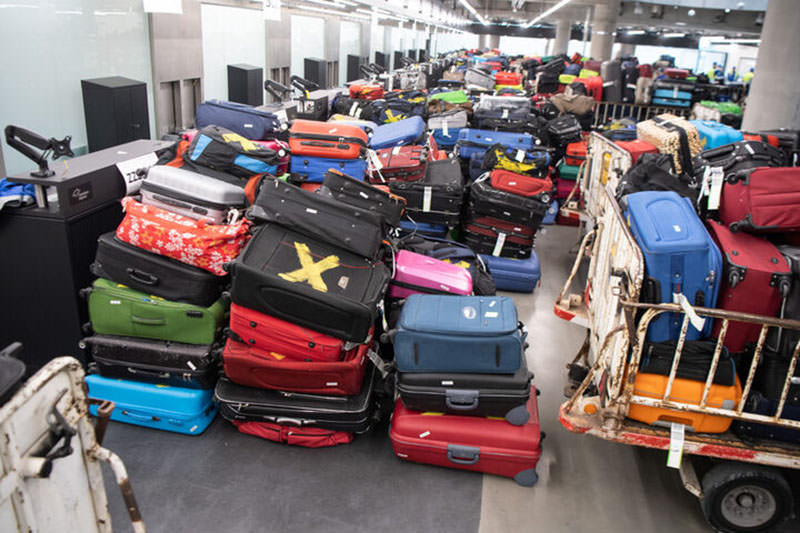
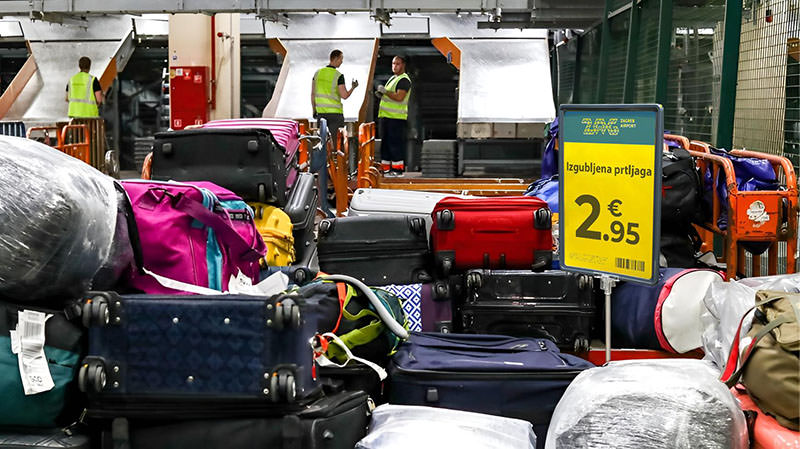
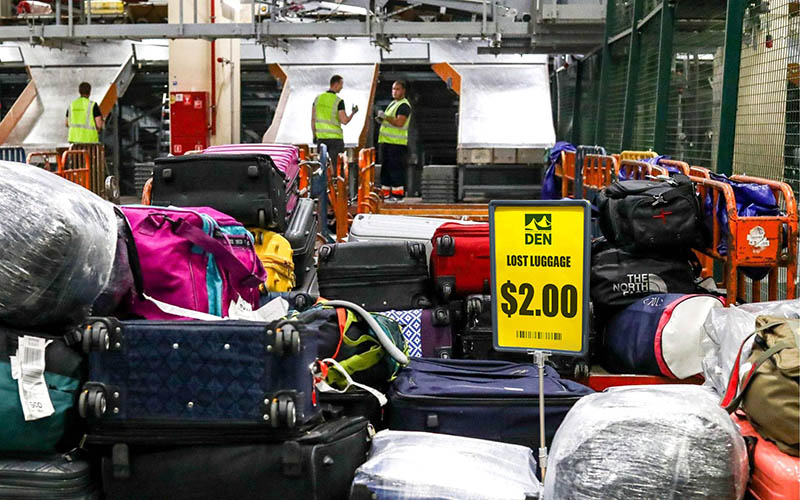
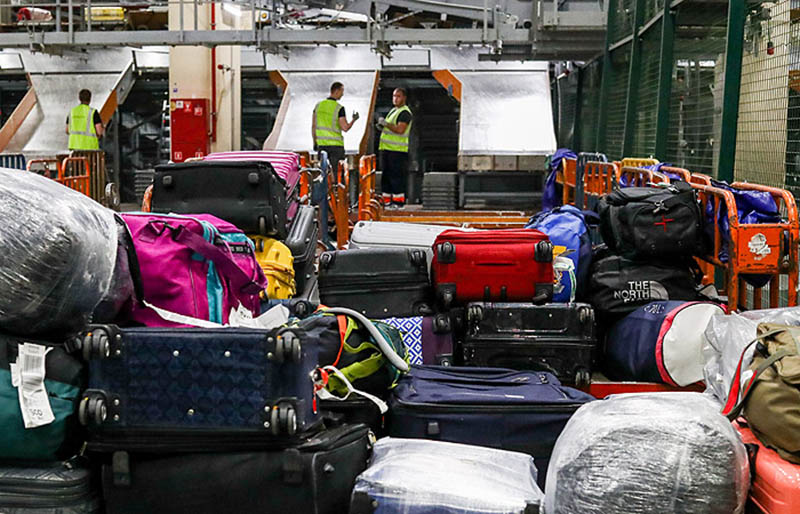
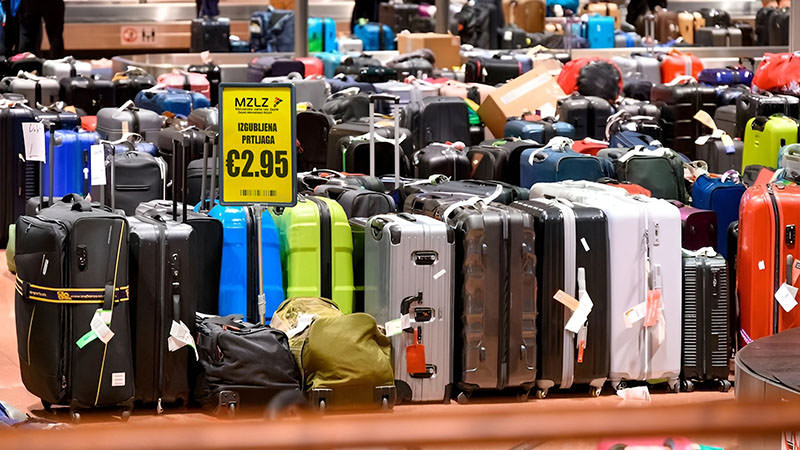
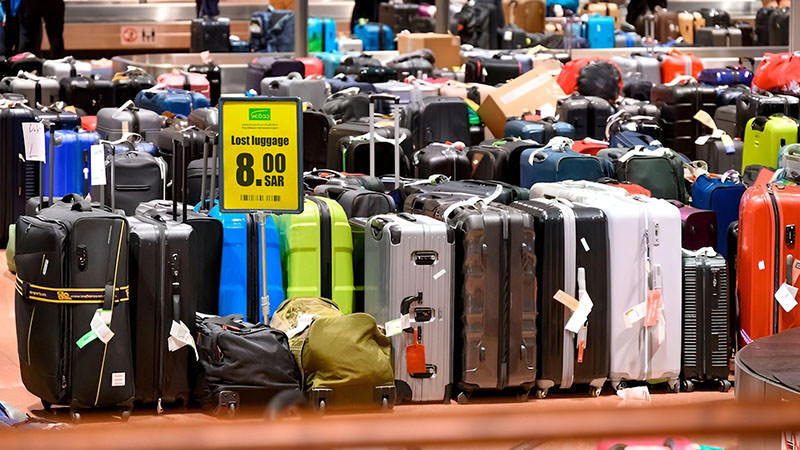
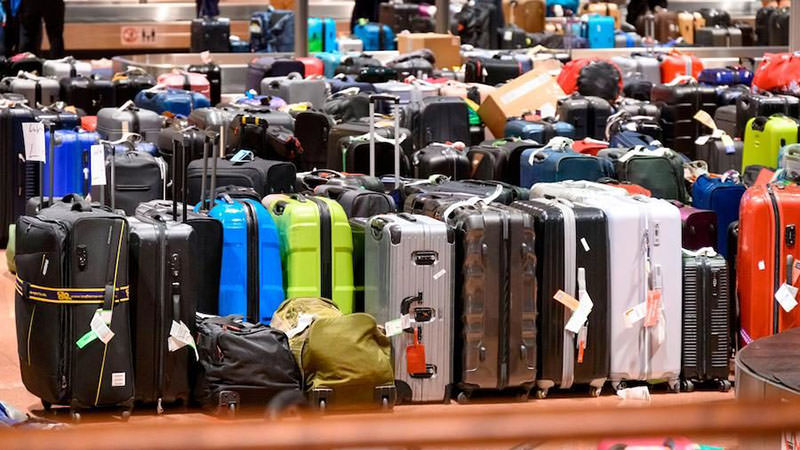
“I even traveled over Zagreb Airport, but didn’t pay attention to the images”, Ana admits. “Actually, I’m not even an online shopper. But this caught my attention, and I told to myself, okay, let’s do something spontaneous for once. It’s just 2 euros, so let me see. And it turned out as a curse, a global fraud.”
Welcome to the club!
“I followed the link for orders, registered through it, and paid 2 euros. That’s how it started”, Ana explains. “First, I found it strange that they charged me only 2 euros when the advertised price for a suitcase was 2.95.”
But what initially sounded like an unexpected discount opened the doors to unsolicited e-mails. “When the announcement of the membership arrived, that’s when I became suspicious”, she says.

“Hello, Ana! First of all, welcome to the club!”, the email said, courtesy of Weshopforme.com, a website Ana never even heard of, let alone registered for. “Don’t hold back – explore our wide range of high-end products and enjoy the member prices without limits.”
Mario was welcomed by the webshop on ForMyDIY.com, with an identical greeting: “Hello Mario! First of all, welcome to the club! Don’t hold back – explore our wide range of high-end products and enjoy the member prices without limits.”
Filip B., another scammed victim I talked to, became a member of Getallsporty.com.
The websites may have been different, but each had the same terms and conditions. Our baggage hunters unwillingly stepped into a trap – membership schemes that required regular purchasing of products offered on these websites. New credits needed to be bought every 14 days, and this reload was automatic.
Cyprus connection
Each of our victims was unknowingly redirected to a different webshop, but all of them had a common guardian angel. The baggage mishandlers were protected via PrivacyGuardian, a service that, ironically, aims to protect the real owners of these websites against “identity theft, SPAM and other unsolicited outreach”. However, according to the information the webshops displayed, there was another common thread. All of them seemed to be based in the sunny Mediterranean paradise of Cyprus. Per Cyprus Corporate Registry, the companies behind them have all been registered in late 2023. Weshopforme.com is the project of Pokrou Limited (director Ionis Iordanidis, registered in Larnaka on September 8th, 2023), ForMyDIY.com is run by Tachano Limited (director Efthymios Souroukidis, registered in Limassol on November 15th, 2023), and Getallsporty.com is the webshop of Zamazi Limited (director Artemis Messiou, registered in Limassol on November 19th, 2023). However, all webshops had contact numbers starting with (+44), which directs customer support calls to the UK.
The cost of clicking
Ana was welcomed in the Basic Membership tier, valued at 26 euros. She registered with a Visa debit card, the same card she uses to receive her monthly salary, and gave its details to an unknown webshop. “Thankfully, I have a protected card, so one cannot charge it without my authorization”, she says.
Mario used his Mastercard credit card, the one with a monthly limit. Luckily for him, he always swims in the red, so the webshop had some trouble with charging him.
“I didn’t follow emails, but I saw they attempted to take 38 euros from the card”, the electrician says. “As I was in minus, they couldn’t do it. After I transferred some money to the card, they took 17 euros for the membership.”
His membership was quickly upgraded from the allegedly Free Account (with a 17 euros balance), via a Basic Membership (valued at 28 euros), to a Prime Membership (valued at 38 euros, the amount they wanted to charge initially).

Informed that his next 38 euro top-up was coming up, Mario decided to cancel the membership he never applied for, but even that didn’t come at no cost.
“Our commitment is to provide you with the best customer service and ensure your complete satisfaction”, Emma from customer support wrote. “Please take note that, in accordance with our Terms and Conditions, the cancellation fee is a non-refundable charge. The specified fee of 6.95 eur serves as the membership cancellation fee for opting out of your 14-day subscription cycle.”
Of course, that fee had to be charged independently of the €17 credit Mario unknowingly purchased earlier, and didn’t even manage to use. The cost of his lost luggage adventure was 2 euros for the undelivered lost suitcase, 17 euros for subscribing, and 6.95 euros for unsubscribing, totaling €25.95.
Here’s what you should have done with your €2.95!
Were you tempted to invest (read: lose) a couple of dollars in this lost luggage scheme? Why not support investigative journalism instead? We, humans, easily fall for tricksters. But how often do we act in favor of those keeping us informed? If you find this article helpful, support us to continue shedding light on shady businesses by donating your €2.95 (or whichever amount you find suitable) to our PayPal account. Thank you!
Baggage bandits recruiting the naive
Filip B., who returned from Germany to Bistra, a small municipality in Zagreb County, has been disgruntled by his entire experience, so much so that he has “no intention of using any webshop but Croatian ones, from now on”.
These 2 euros for the luggage is such a small amount that it draws naive people in, like myself and my familyFilip B.
Coincidentally, even if he was subscribed to a different webshop membership, his customer support agent was also called Emma, just like the one Mario was in touch with.
“Dear Filip, Thank you for contacting us! Getallsporty.com is a shopping site, and I see you have signed up for a membership that gives you access to our products from a wide variety of brands with savings of up to 80%.”
When he gave his Aircash details for what he thought was a lost luggage sale, Filip never intended to “get all sporty” on a website that tries to sell him e-books such as “6-Pack Abs Secrets” or “100 Golf Tips”.
“These 2 euros for the luggage is such a small amount that it draws naive people in, like myself and my family”, Filip confesses.
What was supposed to be just a small speculative investment transformed into a nefarious scheme that resembled a membership in the world’s most expensive online (!) gym.
“From everyone who gives data, they take 70 euros every week. This amount is supposedly available for purchase in the Getallsporty webshop, but if you try to execute it, an error message appears. These guys are pros!”
Undisclosed fees can quickly add up in any business, tourism business especially. Here's what you need to know about hidden travel expenses!
Goodbye to 846 euros
When he first started receiving spam emails, Filip didn’t open them, because he was suspicious of their origin. After four weeks, he became aware that he didn’t just say goodbye to 2 euros for the undelivered lost luggage, but also to 280 euros for membership fees.
“Both me and two of my immediate family members, we were all losing 70 euros per week. They were charging my Aircash, and emptying up their current accounts”, Filip shares. “And you cannot trace them. They’ve been reported, but sadly, we don’t know who is behind this. Whoever is making these charges cannot be located. How come something like that doesn’t go public? I don’t understand!”
The family that lost 846 euros in the blind hope that they would just get lucky with some forgotten suitcases, will have a hard time forgetting this unsettling episode.
“If someone could only stop these frauds! If only I knew who’s behind this, I would feel better”, Filip says. “They take relatively small amounts. In police, they told us that’s because they don’t want the issue to escalate. But if they take 70 euros from 1,000 people a day, that comes to a significant sum. They are breaking a bunch of laws, and yet nobody is taking action!”
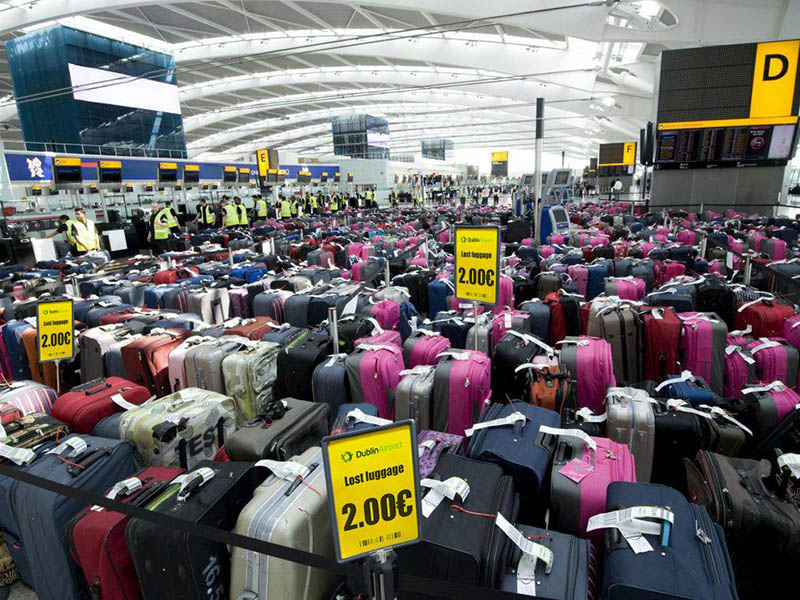
The maze of Facebook fakes
In the past six months alone, dozens if not a three-digit number of fake Facebook pages appeared, pretending to be lost luggage bargain services, airport warehouses, or airports themselves. Some of them were registered as airport terminals, others as charities or flea markets, but there were also those classified as entertainment websites or marketing agencies.
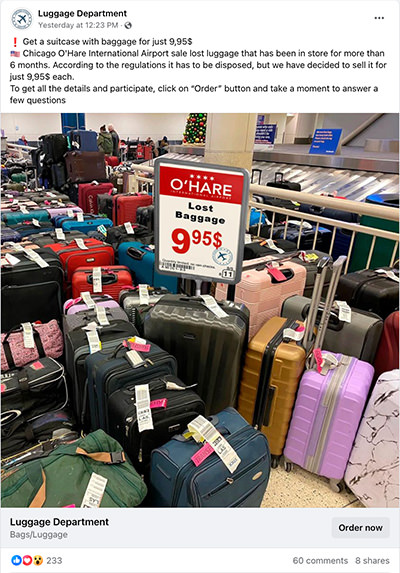
For Zagreb Airport, there are more impostors than at a celebrity look-alike contest. At least four fake Facebook pages enable the scam at this very moment (‘Zračna luka Zagreb’ – 2.5k followers, ‘Međunarodna zračna luka-Zagreb’ – 26 followers, ‘Zagreb International Airport’– 99 followers, and another ‘Zagreb International Airport’ – 20 followers). There are also at least two dormant pages with bizarre names (‘Air/izgubljeni prtljag/zračna luka/HR’ – 2 followers, ‘Izgubljeni prtljag/zračna luka/HR’ – 2 followers).
Except for the possibly hacked JOLIE account, all other fake Zagreb Airport Facebook pages were created between the 6th and 8th of September 2022, just like the fake lost luggage sales in New York, Denver, Copenhagen, Oslo, Frankfurt… While there are pages created on other dates too, this coincidence suggests a globally coordinated effort that didn’t just happen overnight but was carefully planned for years.
Some “Lost Luggage” pages created in this timeframe are still not used for the fraud, so we may interpret them as possible plan B’s, in case the other scammy pages get taken down.
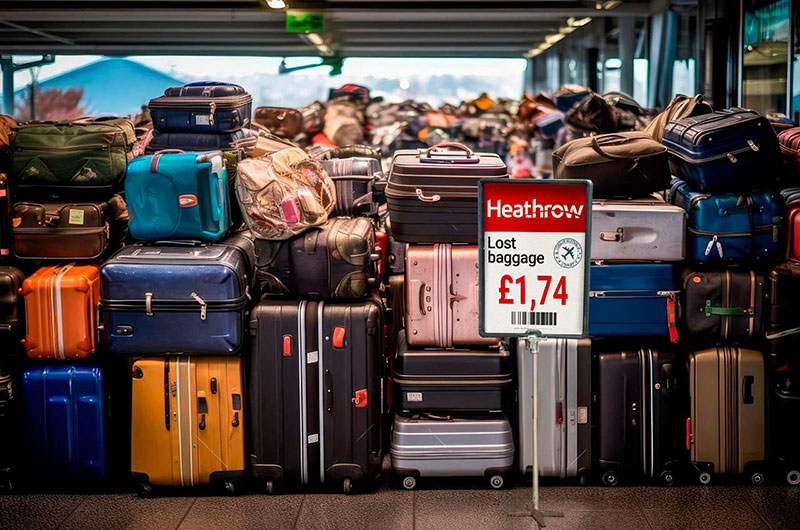
Scams in every time zone, from Dublin to Doha
The scale of this fraud is impressive. Scammers have spread their wings over all continents except Antarctica. So if you’re not a penguin, you definitely have to watch out!
Before Zagreb, lost luggage scams hit European airports such as Dublin Airport in Ireland, Heathrow and Gatwick in London, UK, Malta International Airport, Larnaca Airport in Cyprus, Geneva Airport in Switzerland, Oslo Gardemoen Airport in Norway, Helsinki Airport in Finland, Vienna Schwechat Airport in Austria, and Václav Havel Airport in Prague, Czech Republic.
Over in America, the fraudsters focused on airports such as JFK in New York, Denver International Airport in Colorado, Chicago O’Hare International Airport in Illinois, Dallas Fort Worth Airport in Texas, and Toronto Airport in Canada.
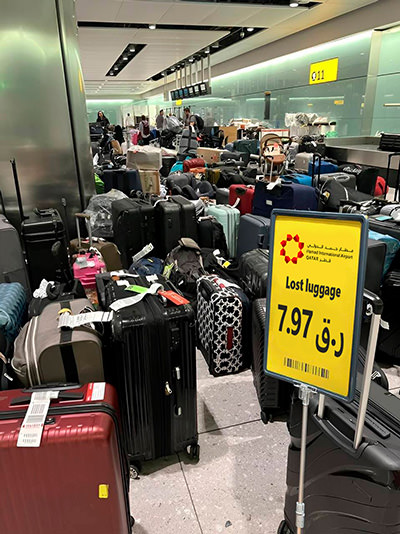
When looking for opportunities to find easy money with lost luggage in Asia, scammers turned to Hamad International Airport in Doha, Qatar, King Abdulaziz International Airport in Jeddah, Saudi Arabia, Ben Gurion Airport in Tel Aviv, Israel, Bandaranaike International Airport in Sri Lanka, Ninoy Aquino International Airport in Manila, the Philippines, Changi Airport and Singapore Airlines in Singapore, as well as Malaysia Airports.
Down under, in Oceania, the digital con artists have been tricking customers with impersonations of Sydney International Airport in Australia, as well as Auckland Airport and Air New Zealand in New Zealand.
Africa wasn’t spared either. The unclaimed baggage sale was falsely advertised at O.R. Tambo International Airport in Gauteng, South Africa, while for the supposed luggage raffle of South African Airways in Pretoria fraudsters produced even a series of videos.
Fraudsters can appear around any corner when traveling. Read about my experience on a local African bus!
Can you buy lost luggage?
If there are so many fake lost luggage sales, does it mean there are real ones too? Can you buy unclaimed luggage from the airlines? Are there secret stash auctions where you can snag yourself a mystery suitcase?
Even if they are the most common setting promoted through this fraud, airports do not typically hold lost luggage sales or auctions. Lost luggage is primarily handled by airlines who are the ones “signing the contract” with passengers to transport their belongings from place A to place B. If your bag decides to go on its own little adventure without you, it’s the airline whose responsibility is to reunite you with it.
But airlines also don’t typically engage in storing luggage that was not collected. They simply do not have capacities for that, nor it is their core business. They will do everything to get the lost luggage to a rightful owner as otherwise, they need to pay a high compensation.
Exceptionally, truly exceptionally, there could be a business selling the contents of lost bags, such as the Unclaimed Baggage Center in Scottsboro, Alabama. They buy up a small percentage of unclaimed baggage, sift through it, clean the valuables, and then resell them in their store.
Suitcase auctions are extremely rare. If they do happen, they will not just pop up on suspicious Facebook pages. They’ll be hosted by reputable sources, and advertised on official internet domains.
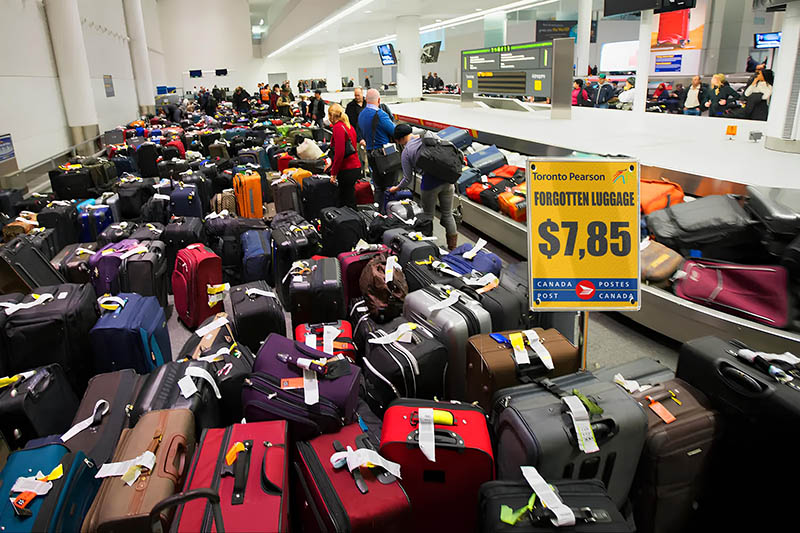
How to spot lost luggage scams?
Whenever you see an ad campaign that seems too good to be true, take a step back, and rethink about it. There are a variety of clues that will let you detect whether a certain opportunity is legit, or just a scam. These are the main methods to sniff out a Facebook fraud!
1. Investigate Facebook page transparency
Every Facebook page has a history, and you can easily check it out in the section called ‘Intro’ (if you’re on desktop), or ‘Details’ (on mobile phones).
Click next to the little ‘i’ (for information), and you should be able to learn when the Facebook page was created, when it changed its name, and sometimes even in which countries the people who manage the page are based.
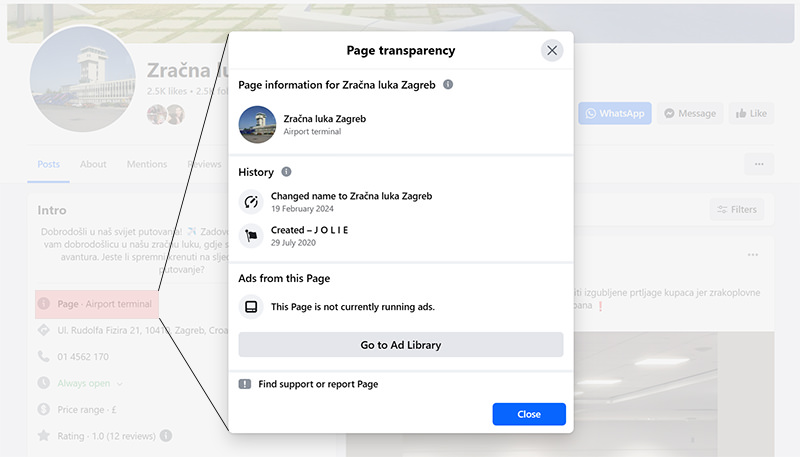
2. Scroll, scroll, scroll
Don’t be fooled by the most recent posts on the Facebook page. Scroll down and you may discover that your airport was advocating for women’s shoes before.
Scammers are always looking for the easiest way to take your money. As they’re busy with finding the most gullible victims, they don’t necessarily take time to erase the history of the page contents.
Whether the page was hacked by someone or was used for another fraud before, the date when the page was created or the sudden unexplainable switch in content could give away that something is off. No real airports will overtake other Facebook pages.
3. Look for a blue verification badge
The blue tick next to the Facebook page name, also known as the verified badge, tells you that it represents a brand that has been confirmed by Facebook as authentic.
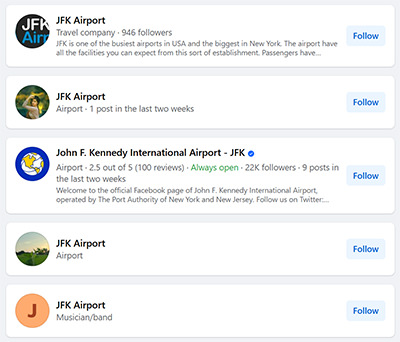
Sadly not all airports (the real Zagreb Airport included) go through a process of obtaining this Meta verification checkmark. But many notable airports, such as Heathrow or John F. Kennedy International Airport – JFK, will have the verification badge.
If you look for a certain page on Facebook, the search will show a variety of results, but those with the blue stamp of approval should be the ones you should trust as truthfully represented.
4. Dive into reviews
Besides just focusing on the posts published by the Facebook page, which is always controlled by the page admin, pay attention to the ‘Reviews’ tab. This is where you will find comments from other users.
Yes, this could also be flooded with feedback like “best deal ever!”, but it could also have comments possibly exposing the page as a scam. Put on your skeptic hat!
5. Be skeptical about users’ comments
Especially if they are overly glowing, be skeptical about the comments satisfied users leave under posts. On scammy pages, their role is to convince you to “join the club”, and not necessarily to give an honest opinion.
Click on their profiles, and check them too. If you don’t see the typical activity you would find on Facebook profiles of your real friends, if you don’t see a history of usual interactions, posts, pictures, etc., you should question the legitimacy of these “customers”. Were their profiles created yesterday? Do you trust these are real people?
Also, pay attention to when the positive comments were posted. You could discover that all were posted on the same date, at the same time, all at once. If that was weeks ago, and no new comments were left in the meantime, that is a red flag that everything is staged. Scammers may be removing newer comments of discontent users. A good product will always have a steady in-flow of comments, posted at different times, and not all at once.

Another thing you could sometimes notice is that on different posts, different people are leaving identical testimonies with identical photographs. I have found instances where, even under the same post, comments are repeated by different people, which just shows the level of attention scammers invest in these scams.
6. Watch out for linguistic and grammatical errors
Even if, in the age of AI, scams are becoming more and more sophisticated, scammers are rapacious and often too lazy to put a greater effort for a small gain.
Instead of the professional language you would expect in airports’ social media communication (typically large offices where many employees take care of their employer’s marketing), you might find amateurish content on scam pages.
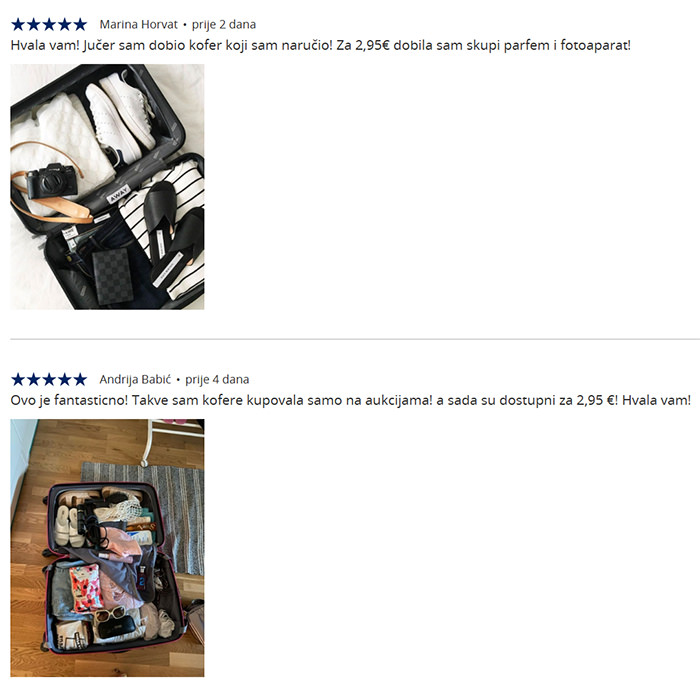
If they are based in a foreign country, the scammers might have telling grammatical errors that no professional organization would tolerate.
You could possibly recognize bad grammar and language errors even in the faked positive comments of the page supporters.
On Zagreb Airport lost luggage scam webpage, for instance, out of four 5-star reviews, three were left with wrongly used gender (male customers speaking in female form, and females in male form).
7. Learn how to use reverse image search
Google, Bing, and other search engines are not just places to answer verbal queries. You can also use them to look for images.
If a Facebook page shares photographs to convince you of the authenticity of their service, you can easily check if the images appeared on the web before.
You can do that directly on the Facebook page by right-clicking on the image. Depending on the browser you’re using, you will find an option ‘Search image with Google’ (in Chrome) or ‘Search the web for image’ (in Edge), etc. This action will help you find the image source or at least other web pages that include the image. You may be surprised that the photograph of that Changi lost luggage scam in Singapore was actually shot somewhere in Germany.
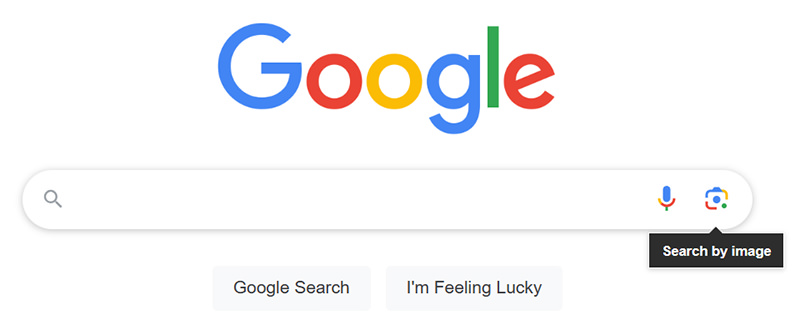
Alternatively, you could also save the suspectable image on your computer, and then visit your usual search engine (Google, Bing, etc.). Instead of writing a textual query, use the ‘search by image’ or ‘search using an image’ icon (next to voice search), and drag-and-drop the image whose online history you want to learn about.
8. Use the whois domain lookup
Whenever clicks lead you to another webpage, don’t just trust the content and the logos trying to convince you that you are on the official page of an airport or any other organization.
Before sharing personal information, always double-check what is written in the URL or the address bar, as you might be redirected to another suspicious page. If it looks like a mishmash of random words, it’s probably a scam.
For instance, Zagreb Airport lost luggage scam’s unwitting victims were led to suspicious domains. They had the misleading word “fly” in it, but the specific path that followed the domain name clearly had webshop vocabulary that had nothing to do with the airport.
- products/abstract-face-flower-vase
- products/automatic-rolling-ball
- products/eufy-robovac-15c-max-robot-vacuum-cleaner-boostiq-wi-fi-super-thin-2000pa-suction-quiet-self-charging-robotic-vacuums-cleans-hard-floors-to-medium-pile-carpets
While this would be an easy tell for those paying enough attention, you could also just end up on a simple domain you know nothing about. If fly3aga3.quest or fly4bamb1.shop doesn’t already sound suspicious, you can google ‘whois domain lookup’ and use any of the whois services to check who are registered users of the domain. You might not be able to find out who they are if scammers hide behind some privacy protocol. However, official websites of airports will typically not hide the registrant’s name.
9. Stay skeptical
The offer of getting a loaded suitcase for just €2.95 is a fantastic deal, but try to approach it rationally.
If the airport is trying to save money because of the expenses related to storing lost luggage, would they really:
- Give away suitcases full of valuables for practically pocket change?
- Cover the costs of creating a special website and a special Facebook page?
- Organize a photo shoot of suitcases with yellow price displays for a sale that is entirely – online?
- Mention the charity or humanitarian background of the promotion without providing any detail as to where the collected money would go to?
- Offer free shipping for all these suitcases? Is there an economical sense in delivering the product to your doorstep at no charge? Is it viable that they send it for free all the way to Lenka Babičová in Slovakia?

The great suitcase swindle – call to action
If your personal data and credit card details have been already stolen, don’t just sit and wait until things get worse.
I talked to quite a few victims of Zagreb Airport lost luggage scam, and only a minority blocked the card immediately when they started losing money without consent.
To others who gave away their card details to scammers, I suggested they should contact the institution that issued their card (bank or credit card company), and prevent future issues.
Even if I explained that some people lost hundreds of euros, it wasn’t easy to convince everyone. “It’s only 2 euros, so nothing too scary”, one lady said. “But thanks for the warning!”
“I didn’t report it to anyone”, another man said. “It’s a foreign company, police can’t do anything, I’ll just share it on scam pages. I was thinking about going to the bank, as technically they could take everything away from that account. I will consider doing that next week.”
Next week?! Only Ana, who was patiently waiting for her purchased suitcase, recognized the urgency of the action: “Thanks for contacting me, I would’ve waited for a few days otherwise. I called the bank now and blocked the card. They won’t be able to take anything anymore. It’s a tiny amount to block the card, but I prefer not to worry. Better safe than sorry.”
What to do if you become a victim of the lost luggage scam?
So, what are the steps to stay safe(r) after falling for a lost luggage scam? Panic a little, and then do the following:
1. Call your card issuer
Grab your phone, and immediately call your bank, credit card company, or service you used for sending money. Explain the situation, and if you have used a credit card, you might even be able to block the transaction. The sooner your card issuer knows about it, the greater the likelihood of getting your money back.
2. Block that plastic
Ask the issuer to block your card so scammers or connected webshops cannot use its details for future purchases. Prevent them from going on a shopping spree!
3. Unsubscribe and threaten legal action
Hit ‘unsubscribe’ on those programs and their emails. Then, flex your legal muscles and throw around phrases like “breach of trust” and “legal ramifications”.
4. No more payments
Resist the urge to throw more money at the problem, even if they tell you there is a fee for unsubscribing. You might be even contacted by a supposed agency offering to return all your lost money for a fee. That’s also a scam.
5. Report the scam as spam
Mark those emails as spam.
6. Cut communication
Stop talking to scammers. Block them on every platform like you would with a bad Tinder date.
7. Bring out the big guns
Report the fraud to the police, and to a consumer agency in your country. In the United States, that’s the Federal Trade Commission. In Croatia, seek advice from the Ministry of Economy and Sustainable Development.
8. Leave a review
Leave a negative review on the scammy Facebook page. Let the world know about your misadventures in lost luggage land.
9. Report the Facebook page
Don’t just leave nasty comments; hit ‘report’ on that fraudulent Facebook page. Ask friends to join you in the reporting attack. Let Zuckerberg and Co. know they’ve got some cleaning up to do.
10. Try to expose them
Report abuse to PrivacyGuardian or other services used to hide the domain owners.
11. Share this article on social media
Help others not to fall for in the same digital dungeon of online frauds. By sharing this article on social media, you’ll contribute to public awareness of this global epidemic of airport scams.
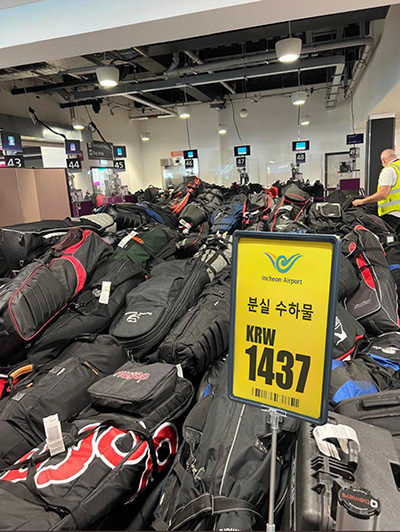
Should victims sue Facebook?
Impersonating pages and fake social media accounts enabled an enormous harvesting of credit card details and personal data. Facebook, the same platform that polices your profile picture as soon as someone objects to it, or even threatens to delete your profile for daring to not use your real name, became the playground for the worldwide web of airport scams. They actively enabled the scam artists to peddle their phony lost luggage deals, as well as the false advertising it comes with. Facebook is directly profiting from these fraudulent offers targeting over-trusting users. Sure, Facebook throws a bone now and then by flagging certain content as false information “checked by independent fact-checkers”. But they don’t remove the posts and the photos and certainly don’t act as quickly as how scammers publish new ones. While sitting back and counting its billions, Meta truly didn’t do much to put an end to a flood of fake luggage sale pages. Opening an impersonating page is easier than ever.
Lost luggage scam – Conclusion
You might be tempted to think that falling for such an obvious internet hoax deserves a standing ovation for the tricksters rather than sympathy for the victims. But hindsight is 20/20; it’s easy to dismiss the fraud after it has happened. This digital shenanigan proved to be able to bamboozle everyone from electricians to business economics specialists.
Facebook users are left to fend for themselves when facing lost luggage scams
Besides people’s wallets, lost luggage scams also damaged the airport brands. However, not all of them approached the seriousness of the problem equally.
Geneva Airport called its followers to help report the fake page.
Sydney Airport pinned the post exposing the scam as a featured post (the first thing you see).
Zagreb Airport? Since their initial warning post on January 3, they’ve been mostly waiting for Facebook gods to remove one of the fake pages. Lost in their newsfeed, this call for caution cannot protect citizens against lost luggage scams which have been, in Croatian case, popping up like mushrooms after rain. I contacted Zagreb Airport for comment on March 13, but their PR team still didn’t find time to respond.
Facebook users are left to fend for themselves, relying on gut instinct and a healthy dose of skepticism when faced with unclaimed luggage sales.
“The victims must be numberless! They never saw it coming”, remarks Ana, whose weak spot was uncovered during a train commute.
Using the railway might sound better than getting stuck in Zagreb traffic jams. But trains in Croatia are extremely slow. They offer passengers too much pastime; time one could spend scrolling through Facebook.
“I don’t play lottery, or gamble. I’m not a risk taker at all!”, Ana insists. “But there, it was a misfortune, a colossal one. It had to be me who fell for it. I should have listened to the music, and not be on Facebook!”
Did you encounter these lost luggage scams on Facebook? What is your experience?
Leave a comment and pin this article for later!
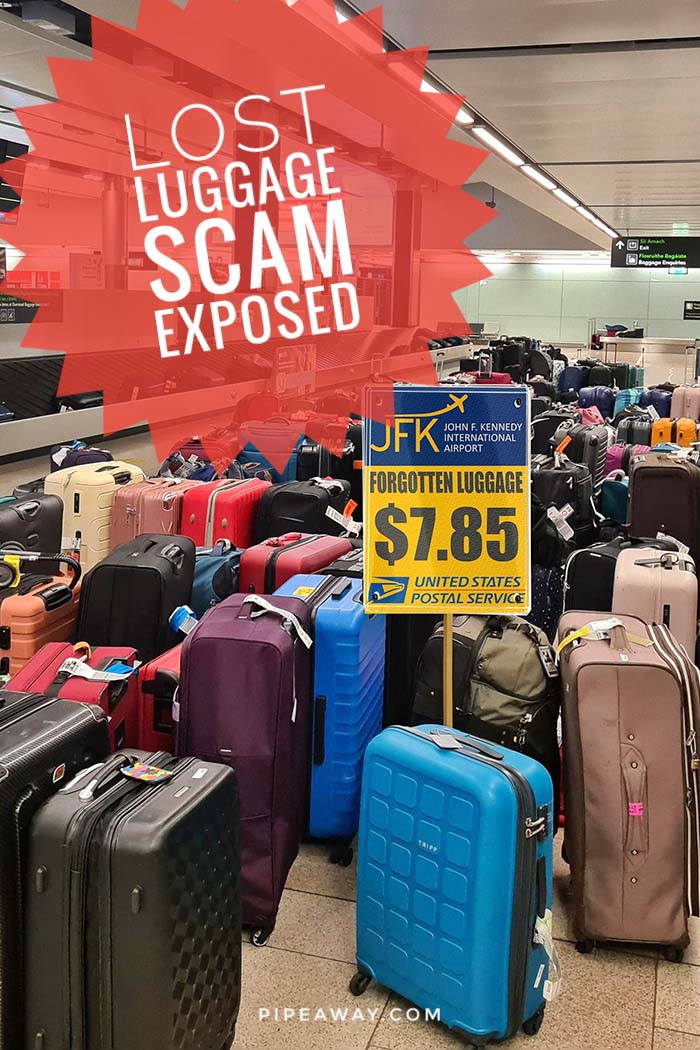

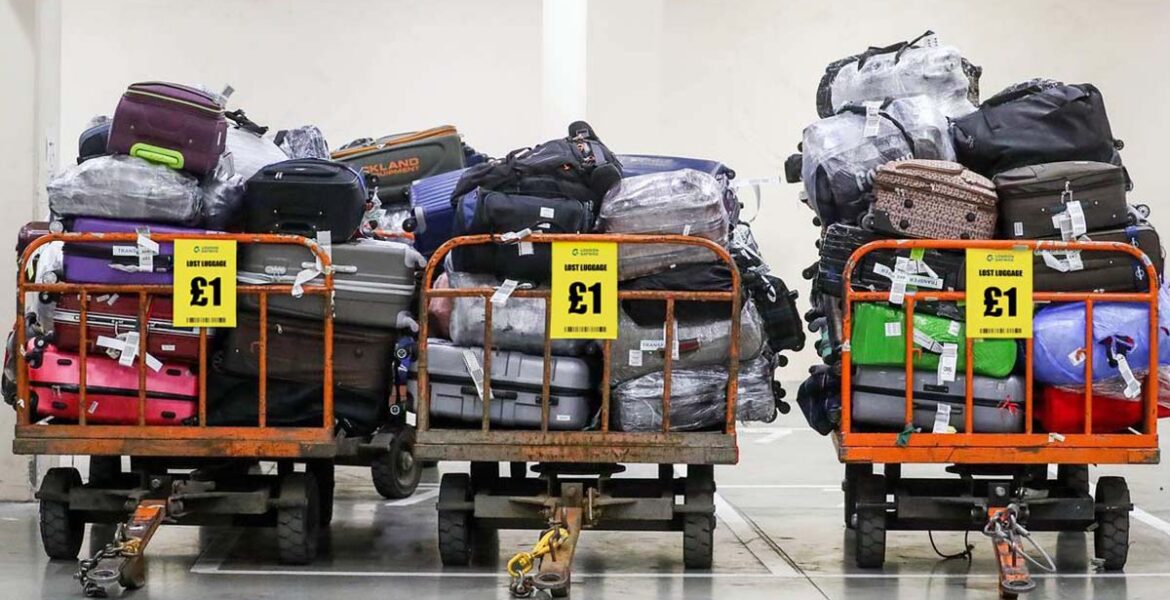

I’d never heard of lost luggage scams like this. It’s hard to believe they get away with this so consistently across airports.
Hey Sonia, it’s shocking, isn’t it?
Lost luggage scams are more common than we realize, and scammers are becoming increasingly sophisticated in their tactics.
It’s a constant game of cat and mouse between fraudsters and their victims.
And the only way out of the game is by staying vigilant and spreading the word to help others avoid falling into the same trap!
It seems like every day I hear about new kinds of scams made possible by our modern technology, like this one. One must be ever viligilant. And as you wrote above–if a deal seems too good to be true, proceed with extreme caution.
Absolutely, Darla!
With the rapid advancements in technology, scammers are finding more creative ways to exploit unsuspecting individuals.
Being vigilant and skeptical of too-good-to-be-true deals is crucial in protecting ourselves from falling victim to these scams.
It’s a digital jungle out there, but with awareness and caution, we can navigate it safely!
The Unclaimed Baggage Store is a little over an hour from my house. I’ve been there a few times and it is truly remarkable not only what ends up there and what you can find but how they run that place. It’s really cool!
Wow, Heather!
That’s like having an exciting opportunity to embark on a treasure hunt every day!
I envy you a little. Did you shop anything unique?